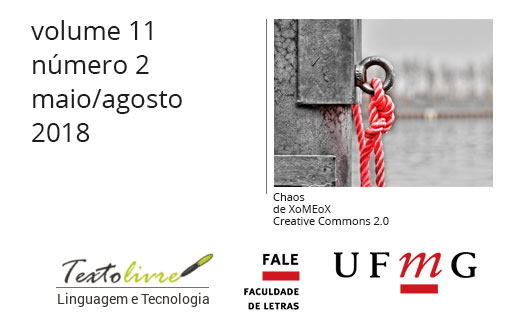Interculturalidade, representação e identidade em contextos de aprendizagem de língua estrangeira via teletandem
DOI:
https://doi.org/10.17851/1983-3652.11.2.18-33Palavras-chave:
ensino-aprendizagem de língua estrangeira, teletandem, interculturalidade, representaçõesResumo
RESUMO: Este trabalho teve como objetivo analisar as representações que emergiram das interações de teletandementre os aprendizes de línguas estrangeiras quanto aos aspectos histórico-políticos de seus países. Discutem-se as negociações dessas representações no processo interacional em diálogo com o outro interagente. Os dados analisados foram extraídos das interações em português, realizadas entre estudantes de graduação norte-americanos, aprendizes de português e estudantes de graduação brasileiros, aprendizes de língua inglesa. Apoia-se nas discussões de Bronckart (2012) sobre representação, de sujeito na pós-modernidade,de Hall (2002), e no conceito de cultura conforme proposto por Welsch (1999), sendo ela transcultural, um processo híbrido e heterogêneo fundado em relações dinâmicas entre culturas. Por meio de uma análise interpretativa qualitativa, foi observado que o contexto de aprendizagem de teletandem constituiu importante locus para o contato intercultural. Assim, verificou-se que as representações foram enunciadas a partir de posições político-ideológicas e contextuais. Desse modo, é importante uma discussão reflexiva dessas representações, para que elas não se tornem um conhecimento fossilizado. Entende-se, também, que as identidades dos participantes se constroem em processos dinâmicos e são caracterizadas pela fluidez e heterogeneidade.
PALAVRAS-CHAVE: ensino-aprendizagem de língua estrangeira; teletandem; interculturalidade; representações.
ABSTRACT: The main objective of this work is aimed to analyze the representations that emerged from the teletandem interactions among foreign language learners, regarding the historical-political aspects of their countries, discussing the negotiations of these representations in the interactional process in dialogue with the other interacting agent. The data analyzed were extracted from the interactions in Portuguese, carried out among North American undergraduates, Portuguese learners and Brazilian undergraduate students, English learners. It is based on Bronckart's (2012) discussion of representation, subject in the postmodernity of Hall (2002) and in the concept of culture as proposed by Welsch (1999), cross-cultural, hybrid and heterogeneous process based on dynamic relations among cultures. Through a qualitative interpretative analysis, it was observed that the teletandem learning context constituted an important locus for intercultural contact. Therefore, it was verified that the representations were enunciated from political-ideological and contextual positions, thus, a reflexive discussion of these representations is important, in order that not to become a fossilized knowledge. Finally, the identities of the participants are also built in dynamic processes and are characterized by fluidity and heterogeneity.
KEYWORDS: teaching and learning a foreign language; teletandem; interculturalism; representations.
Downloads
Referências
ALVES, A. C. Representações sobre o processo avaliativo de docentes de Le egressos do curso de Letras Universidade Federal. Dissertação (mestrado em linguística). Universidade Federal de Uberlândia, UFU, Uberlândia, 117f, 2014.
ARANHA, S. Projeto Teletandem Brasil: línguas estrangeiras para todos – quem somos, de onde viemos, para onde estamos indo. Actes Du XIIIe coloque Pédagogique de l’alliance française de São Paulo, 2012. Disponível em: http://www.aliancafrancesa.com.br/colloque2012/actus/Acte_Solange_ARANHA.pdf. Acesso em: jun. 2015.
BELZ, J. A. Linguistic Perspectives on the development of intercultural competence in tellecollaboration. Language Learning & Technology, v. 7, n. 2, p. 69-99, 2003.
BRONCKART, J. P. Agir nos discursos: das concepções teóricas às concepções dos trabalhadores. Trad. Anna Rachel Machado; Maria de Lourdes Meirelles Matencio. Campinas, SP: Mercado de Letras, 2008.
BRONCKART, J. P. Atividades de Linguagens, texto e discursos: por um interacionismo sociodiscursivo. 2. ed. Trad. Anna Rachel Machado; Péricles Cunha. São Paulo: Educ, 2012.
COUNCIL OF EUROPE. White Paper on Intercultural Dialogue. Living Together As Equals in Dignity, Strasbourg, v. 1, n. 1, p. 1-62, jun. 2008. Disponível em: https://www.coe.int/t/dg4/. Acesso em: 01 nov. 2017.
DENZIN, N. K.; LINCOLN, Y. O planejamento da pesquisa qualitativa. 2. ed. Trad. Sandra Regina Netz. Porto Alegre: Artmed, 2006.
GANESH & HOLMES. Positioning Intercultural Dialogue – Theories, Pragmatics and Agenda. Journal of International Communication, v. 4, n. 2, p. 81-86, 2011.
GUMPERZ, J.; COOK-GUMPERZ. Interactional Sociolinguistics: Perspectives on Intercultural Communication. In: PAULSTON, C.B.; KIESLING, S.F.; RANGEL, E.S. (Eds.). The Handbook of Intercultural Discourse and Communication. West-Sussex: Wiley Blackwell Publishing Ltd, 2012, p. 61-77.
HALL, S. Identidade e pós-modernidade. Rio de Janeiro: Forense Universitária, 2002.
HOLLIDAY. Small Cultures. Applied Linguistics. Oxford University Press. Vol. 20/2, 1999, p. 237-264.
KRAMSCH, C; Uryu, M. Intercultural contect, hybridity, and third space. In: JACKSON, J. (Ed.). The Routledge Handbook of Language and Intercultural Communication. New York: Routledge, 2014, p. 211-225.
KUBOTA, R. Critical Approaches to Intercultural Discourse and Communication. In: PAULSTON, C.B.; KIESLING, S.F.; RANGEL, E.S. (Eds.). The Handbook of Intercultural Discourse and Communication. West-Sussex: Wiley Blackwell Publishing Ltd, 2012, p. 90-110.
MASON, J. Qualitative researching. London, England: SAGE Publications, 1998.
MOITA LOPES, L. P. Pesquisa interpretativista em linguística aplicada: a linguagem como condição e solução. DELTA: documentação de estudos em linguística teórica e aplicada, v. 10, n. 2, p. 329-338, 1994.
VASSALLO, M. L.; TELLES, J. A. Aprendendo línguas estrangeiras in-tandem: historias e identidades. Rev. Brasileira de Linguística Aplicada, v. 8, n. 2, p. 341-381, 2008.
WELSCH, W. Transculturality – the Puzzling Form of Cultures Today. Space of Culture: City Nation, World, ed. by Mike Featherstone and Scott lash, London: Sage, 1999, p. 194- 213.
Downloads
Publicado
Edição
Seção
Licença
Este é um artigo em acesso aberto que permite o uso irrestrito, a distribuição e reprodução em qualquer meio desde que o artigo original seja devidamente citado.











